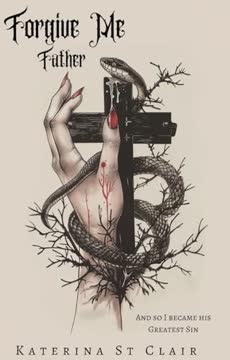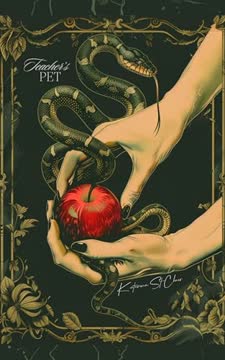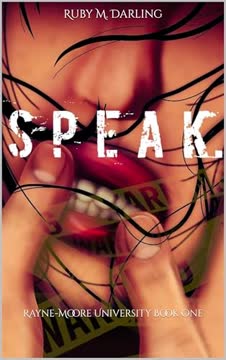Plot Summary
Sunday Masks and Family Lies
Eden Faulkner returns home from college to a family that looks perfect on the outside but is rotting within. Her mother drowns in wine and denial, her father is cold and unfaithful, and her brother Aiden is a pothead with a cruel streak. Eden herself is haunted by trauma, self-harm, and the weight of expectations. Sundays are for church, where the family pretends to be devout, but Eden seethes at the hypocrisy. The rituals of faith are hollow, and Eden's pain is raw and unspoken. The chapter sets the tone: a young woman suffocating in a home where love is conditional, secrets fester, and faith is a mask for survival.
Cathedral Games and Confessions
At Saint Michael's, the Faulkners perform their roles for the congregation, but Eden's cynicism is uncontainable. She finds solace in her friend Zoey, who shares her skepticism about religion. Confession is a game for Eden—she lies to the aging Father Kevin, using outrageous stories to distract from her real pain. The church's grandeur is a stark contrast to the emptiness Eden feels. When Father Kevin announces his retirement, a new, enigmatic priest named Roman Briar arrives, unsettling Eden with his intensity and youth. Their first encounter is charged, hinting at a dangerous connection.
The New Priest's Arrival
Roman Briar's arrival as the new priest electrifies the congregation. He is young, striking, and carries an air of danger beneath his clerical collar. Eden is both repelled and drawn to him, sensing a kindred darkness. Roman's sermons are unconventional, and his presence stirs jealousy, lust, and suspicion among parishioners. Eden's family is quick to involve Roman in their efforts to "fix" her, signing her up for altar service without her consent. Roman, meanwhile, is haunted by his own past and the temptations Eden awakens in him. Their mutual fascination is undeniable, setting the stage for a forbidden, combustible relationship.
Communion and Unholy Touch
During Communion, Roman's touch lingers on Eden's lips, a moment charged with both spiritual and erotic tension. The boundaries between priest and penitent, sacred and profane, begin to dissolve. Roman's authority is both a threat and an invitation, and Eden is both defiant and hungry for his attention. The church's rituals become a battleground for power, submission, and survival. After Mass, Roman and Eden's interactions grow more intimate and dangerous, culminating in a clandestine encounter that leaves both shaken and wanting more.
Overlook Betrayals
Eden's brother and his friends betray her trust, exposing her self-harm scars in a humiliating, violent scene at the Overlook. The boys' cruelty is casual and devastating, and Eden is left stranded, bloodied, and alone in the rain. Roman finds her and becomes both her savior and her tempter, offering comfort laced with dominance. Their connection deepens as Roman confronts her pain and offers a twisted form of penance—pleasure as a substitute for self-destruction. The line between salvation and sin blurs further.
Rain, Rescue, and Temptation
Roman takes Eden home, tending to her wounds and challenging her self-hatred. Their dynamic is fraught with power and vulnerability; Roman's authority as a priest is at odds with his growing obsession. He offers Eden a new way to cope with her pain—through submission and pleasure, not self-harm. Their encounter is both healing and transgressive, a secret pact that binds them together. Eden's family remains oblivious, and the threat of her father's violence looms ever larger.
Sins of the Father
The Faulkner household erupts in violence as Eden's father punishes her and Aiden with physical and psychological abuse. The family's secrets are laid bare: Aiden reveals his own suffering at their father's hands, and Eden is forced to take the blame to protect him. The cycle of abuse is relentless, and their mother is complicit in her silence. Roman, drawn deeper into the family's dysfunction, is both witness and would-be avenger. The church's authority is revealed as corrupt, with Father Kevin and David Faulkner implicated in a web of power and exploitation.
Service, Secrets, and Seduction
Eden's forced service at the church brings her into constant contact with Roman. Their encounters are charged with secrecy, desire, and the threat of exposure. Roman's struggle with his vows intensifies as Eden tempts him, and their relationship becomes a series of escalating dares and confessions. The church is revealed as a front for darker activities—child trafficking and abuse—run by a cabal of powerful men, including Eden's father. Roman uncovers evidence of these crimes, and his role shifts from priest to protector and avenger.
Rivalries and Revelations
Eden's attempt at normalcy with Luca, a seemingly kind suitor, ends in betrayal and violence. Roman's jealousy and possessiveness flare, leading to confrontations that expose the depth of his feelings. The church's criminal enterprise is further revealed, with Eden and other children marked as "inventory" for a secret auction. Roman's investigation puts him in mortal danger, and Eden's world narrows to a fight for survival. The lines between love, obsession, and vengeance blur as the stakes rise.
The Devil in Idlewood
The church's trafficking ring is exposed as a vast, well-oiled machine, with Eden and dozens of children held captive beneath the cathedral. Betrayed by those closest to her—including Luca, who is revealed as a willing participant—Eden is drugged, abused, and prepared for auction. Roman, aided by his old friend Echo from DHS, orchestrates a desperate rescue. The town's complicity is laid bare, and the true extent of the evil festering in Idlewood is revealed.
Bidding and Blood
The night of the auction is a fever dream of horror and retribution. Roman infiltrates the event, killing David Faulkner and other conspirators in a bloody confrontation. Eden, brutalized and on the brink of despair, fights back with everything she has. Echo's team raids the church, rescuing the children and bringing the operation to a violent end. Roman and Eden are reunited, but not before she is gravely wounded. The cost of survival is high, and the scars—physical and emotional—are deep.
Escape and Reckoning
In the wake of the raid, Eden and Roman recover in the hospital, surrounded by survivors and haunted by the trauma they endured. The Faulkner parents are dead, the church's leaders are exposed, and the children are freed. Roman and Eden's love, forged in fire, becomes a source of healing and hope. They leave Idlewood behind, joined by Aiden and Zoey, determined to build a new life far from the shadows of their past.
Sanctuary and Aftermath
Years later, Eden and Roman have built a life together in Scotland, teaching, loving, and raising a family. The horrors of Idlewood are a distant memory, replaced by the quiet joys of freedom and belonging. Their love, once forbidden and fraught with danger, is now a sanctuary. The scars remain, but they are no longer wounds—they are reminders of survival, resilience, and the power of love to redeem even the darkest past.
Healing, Hope, and Home
Eden and Roman's journey ends not with vengeance, but with hope. Their love, tested by trauma and violence, becomes a source of strength and healing. The past cannot be erased, but it can be transformed. Together, they create a home where faith is not a mask, but a choice; where family is not a prison, but a promise. The story closes on a note of hard-won peace, a testament to the possibility of redemption and the enduring power of love.
Characters
Eden Faulkner
Eden is the emotional core of the story—a young woman marked by trauma, self-harm, and the suffocating expectations of her family and church. Her relationship with faith is fraught, shaped by hypocrisy and abuse. Eden's psychological journey is one of reclaiming agency: from victim to fighter, from object to subject. Her connection with Roman is both a source of healing and a dangerous temptation, offering her a way to transform pain into pleasure and submission into power. Eden's arc is about survival, resilience, and the search for a love that can redeem even the darkest wounds.
Roman Briar
Roman is a study in contradictions: a priest with a violent past, a man of faith tormented by doubt, a protector drawn to the very sins he is sworn to resist. His attraction to Eden is both spiritual and carnal, a test of his vows and his humanity. Roman's psychological complexity lies in his struggle to reconcile his desire for control with his need for connection. As the story unfolds, he becomes both Eden's savior and her equal, willing to sacrifice everything—including his priesthood and his soul—to save her. His journey is one of atonement, love, and the fight against institutional evil.
David Faulkner
Eden's father is the embodiment of toxic authority: outwardly pious, inwardly cruel. He wields religion as a weapon, using faith to justify abuse, control, and criminality. David's psychological makeup is defined by narcissism, sadism, and a need for dominance. His relationship with Eden is one of possession, not love, and his complicity in the church's crimes is both personal and systemic. He is the story's primary antagonist, a symbol of the rot at the heart of Idlewood.
Aiden Faulkner
Aiden is both victim and perpetrator, shaped by the same abuse that scars Eden. His relationship with his sister is fraught with resentment, guilt, and a desperate need for approval. As the story progresses, Aiden moves from complicity to courage, risking everything to protect Eden and expose their father's crimes. His arc is one of painful growth, as he learns to break the cycle of violence and become a true ally.
Zoey Lee
Zoey is Eden's anchor—a friend who shares her skepticism about religion and offers unconditional support. Her own family is touched by the church's corruption, and her journey mirrors Eden's in many ways. Zoey's psychological strength lies in her empathy and her refusal to be complicit. She is a survivor, a fighter, and a source of hope.
Luca
Luca begins as a potential love interest, offering Eden a glimpse of normalcy. But beneath his charm lies a capacity for violence and betrayal. His complicity in the church's crimes is a devastating revelation, and his obsession with Eden turns predatory. Luca's arc is a cautionary tale about the dangers of appearances and the ease with which evil can hide in plain sight.
Father Kevin
Father Kevin is the old guard—a priest who has presided over the church's crimes for years. His authority is absolute, his conscience absent. He is both a mentor and a monster, using his position to enable abuse and silence dissent. Kevin's psychological profile is one of moral decay, a warning about the dangers of unchecked power.
Echo
Echo is Roman's old friend and a DHS agent. He represents the possibility of rescue and accountability, bringing the resources and resolve needed to dismantle the church's trafficking ring. Echo's presence is a catalyst for action, forcing Roman and Eden to confront the full scope of the evil they face.
Hannah
Hannah is one of the trafficked children, her suffering a stark reminder of the stakes. Her bond with Eden is a source of mutual comfort and courage. Hannah's survival is a testament to the resilience of the human spirit and the importance of fighting for those who cannot fight for themselves.
Morgan Faulkner
Eden's mother is a tragic figure, numbed by addiction and paralyzed by fear. Her inability to protect her children is both a source of pain and a reflection of the story's central theme: the ways in which systems of power silence and destroy those who are most vulnerable.
Plot Devices
Duality of Faith and Sin
The narrative structure is built on the tension between faith and sin, sacred and profane. The church is both a sanctuary and a site of horror; rituals are both comforting and corrupt. This duality is embodied in Roman and Eden's relationship, where confession becomes foreplay and penance is both punishment and pleasure. The story uses religious imagery to heighten the stakes, turning every act of submission or defiance into a spiritual battle.
Power, Submission, and Survival
The story's central dynamic is one of power—who wields it, who submits, and who survives. Eden's journey is about reclaiming agency, turning submission into a source of strength. Roman's struggle is about learning to use his power for protection, not domination. The plot is driven by escalating acts of violence, betrayal, and resistance, with each character forced to confront the limits of their control.
Foreshadowing and Revelation
The narrative is structured around secrets—personal, familial, institutional. Confession is both a literal and metaphorical device, allowing characters to reveal their deepest wounds and desires. Foreshadowing is used to build suspense, with early hints of abuse and corruption blossoming into full-blown horror. The story's revelations are timed for maximum impact, forcing characters to choose between complicity and courage.
Trauma and Transformation
The story is unflinching in its depiction of trauma—physical, sexual, emotional. But it is also about the possibility of transformation. Pain is not erased, but it is repurposed; scars become symbols of survival. The narrative arc is one of descent into darkness followed by a hard-won ascent into healing and hope.
Found Family and Redemption
The ultimate plot device is the creation of a new family—one built not on blood or faith, but on choice, loyalty, and love. Eden and Roman's relationship is a crucible, burning away the lies and leaving only what is true. The story ends not with vengeance, but with the promise of redemption: a future where the past is not forgotten, but transformed.
Analysis
Forgive Me Father is a harrowing, unflinching exploration of trauma, faith, and the search for redemption in a world poisoned by hypocrisy and abuse. Katerina St. Clair's novel uses the trappings of dark romance and thriller to interrogate the ways in which power—religious, familial, sexual—can be both destructive and redemptive. The story's central relationship, between Eden and Roman, is a crucible for these themes: their love is forged in pain, their intimacy a battleground for agency and healing. The novel does not shy away from the realities of abuse, self-harm, and institutional evil, but it also insists on the possibility of survival and transformation. The lessons are hard-won: faith is not a mask, but a choice; love is not submission, but mutual recognition; family is not destiny, but a promise we make and keep. In the end, Forgive Me Father is a testament to the resilience of the human spirit and the power of love to redeem even the darkest past.
Last updated:
Review Summary
Forgive Me Father received mixed reviews, with many readers disappointed by the lack of tension and character development. Critics cited issues with pacing, excessive trauma, and unrealistic plot elements. Some found the writing poor and suspected AI involvement. Positive reviews praised the dark romance and spicy content. Common complaints included instalust, problematic scenes, and insufficient exploration of religious themes. While some readers enjoyed the book's intensity, others felt it fell short of expectations, particularly compared to similar works in the genre.
The Shadows of Darkness Universe Series
Similar Books
Download PDF
Download EPUB
.epub digital book format is ideal for reading ebooks on phones, tablets, and e-readers.















